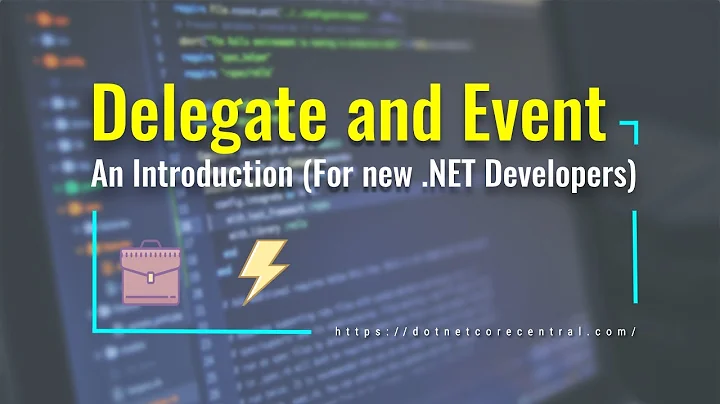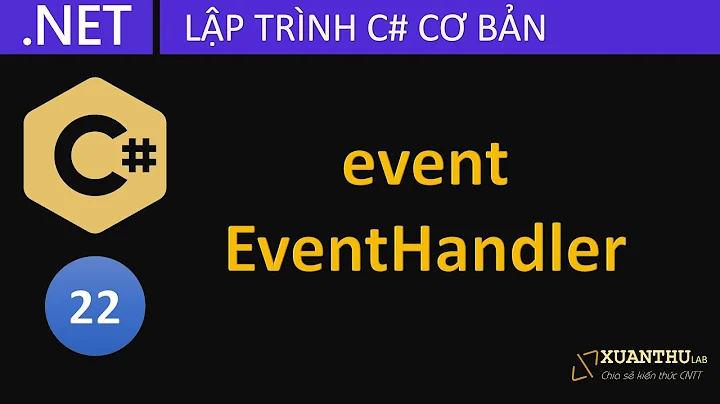C#: Raising an inherited event
Solution 1
What you have to do , is this:
In your base class (where you have declared the events), create protected methods which can be used to raise the events:
public class MyClass
{
public event EventHandler Loading;
public event EventHandler Finished;
protected virtual void OnLoading(EventArgs e)
{
EventHandler handler = Loading;
if( handler != null )
{
handler(this, e);
}
}
protected virtual void OnFinished(EventArgs e)
{
EventHandler handler = Finished;
if( handler != null )
{
handler(this, e);
}
}
}
(Note that you should probably change those methods, in order to check whether you have to Invoke the eventhandler or not).
Then, in classes that inherit from this base class, you can just call the OnFinished or OnLoading methods to raise the events:
public AnotherClass : MyClass
{
public void DoSomeStuff()
{
...
OnLoading(EventArgs.Empty);
...
OnFinished(EventArgs.Empty);
}
}
Solution 2
You can only access an event in the declaring class, as .NET creates private instance variables behind the scenes that actually hold the delegate. Doing this..
public event EventHandler MyPropertyChanged;
is actually doing this;
private EventHandler myPropertyChangedDelegate;
public event EventHandler MyPropertyChanged
{
add { myPropertyChangedDelegate += value; }
remove { myPropertyChangedDelegate -= value; }
}
and doing this...
MyPropertyChanged(this, EventArgs.Empty);
is actually this...
myPropertyChangedDelegate(this, EventArgs.Empty);
So you can (obviously) only access the private delegate instance variable from within the declaring class.
The convention is to provide something like this in the declaring class..
protected virtual void OnMyPropertyChanged(EventArgs e)
{
EventHandler invoker = MyPropertyChanged;
if(invoker != null) invoker(this, e);
}
You can then call OnMyPropertyChanged(EventArgs.Empty) from anywhere in that class or below the inheritance heirarchy to invoke the event.
Solution 3
I am assuming I cannot access these events the same as other inherited members?
Precisely. It's customary to provide a protected function OnXyz or RaiseXyz for each event in the base class to enable raising from inherited classes. For example:
public event EventHandler Loading;
protected virtual void OnLoading() {
EventHandler handler = Loading;
if (handler != null)
handler(this, EventArgs.Empty);
}
Called in the inherited class:
OnLoading();
Related videos on Youtube
jwarzech
Former C# and Ruby developer, curious about all technologies/platforms.
Updated on September 19, 2020Comments
-
jwarzech over 3 years
I have a base class that contains the following events:
public event EventHandler Loading; public event EventHandler Finished;In a class that inherits from this base class I try to raise the event:
this.Loading(this, new EventHandler()); // All we care about is which object is loading.I receive the following error:
The event 'BaseClass.Loading' can only appear on the left hand side of += or -= (BaseClass')
I am assuming I cannot access these events the same as other inherited members?
-
 Eliahu Aaron about 4 yearsThis question was already answered by Frederik Gheysels. The same practice is recommended on Microsoft Docs: How to raise base class events in derived classes (C# Programming Guide) as an official "C# Programming Guide"
Eliahu Aaron about 4 yearsThis question was already answered by Frederik Gheysels. The same practice is recommended on Microsoft Docs: How to raise base class events in derived classes (C# Programming Guide) as an official "C# Programming Guide"
-
-
Max Schmeling about 15 yearsThose methods should be protected virtual unless there's some reason to do otherwise.
-
meandmycode about 15 yearsBy guidelines Microsoft says it should be virtual so that inheritants can control the event.. additionally the On protected method should take event args, not create them itself. This answer is wrong compared to the correct one by Adam Robinson.
-
Adam Robinson about 15 years@Frederik: The convention for inheritors handling events is to override the raising event rather than attaching it themselves, as a) polymorphism is (slightly) more efficient than a multicast delegate, and b) it gives them control over when their code is executed (ie before or after subscriber code)
-
meandmycode about 15 yearsOfficial guidelines: msdn.microsoft.com/en-us/library/w369ty8x(VS.80).aspx
-
Frederik Gheysels about 15 yearsmeandmycode: regarding the arguments: this is just some example code. Offcourse it is better to pass them as arguments ... I'll change it if it makes you happy. :o:
-
Frederik Gheysels about 15 yearsRegarding making the method virtual, so that inheritors can override the event invocation behaviour: How many times have you been in a situation where this was necessary ? Next to that; in the overriden method, you can't raise the event, since you'll get the same error as the one mentioned by TS.
-
Frederik Gheysels about 15 yearsYes, you can raise it by calling the base implementation. But what other additional functionality could you possibly think of ?
-
meandmycode about 12 years@Verax I follow it because the reasoning is sound, depending on how re-usable and extensible I expect the code to be, I provided official guidelines to back that up.. at the time of writing you also seem very new to .NET Verax so it is a little perplexing that you dug this up to disagree with my 7 years of experience
-
makerofthings7 about 12 yearsI had some issues implementing this... stackoverflow.com/q/10593632/328397
-
public wireless over 9 yearsNote that this article warns against declaring virtual events and overriding them as it claims the compiler doesn't handle this correctly: msdn.microsoft.com/en-us/library/hy3sefw3.aspx
-
cowboydan almost 6 yearsI prefer this answer as it explains WHY you have to use the approach instead of just the approach. Nice work.







